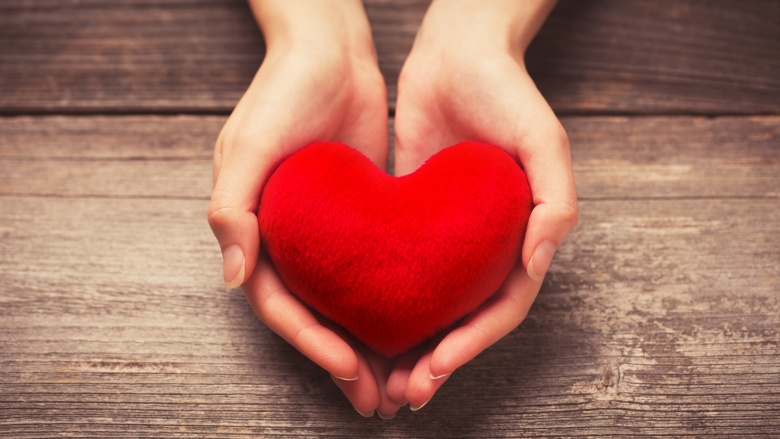What Really Happens To Your Body When You Feel Thankful
It's good to be grateful. Focusing on all the gifts in your life will make you feel better, and not only mentally. But here's the crazy part — instead of waking up and giving thanks for another beautiful day, most of us reach for our phones and immediately start checking email and Facebook. Instead of thinking about how lucky we are to have a warm home, clean water and loving friends, we focus on our annoying coworkers,worrying about being late, and never-ending piles of work.
Maybe you'd be a little more likely to focus on the good things in your life if you knew how beneficial being thankful really is. Being grateful improves your body both mentally and physically — here's how.
Your heart is healthier
When you start a regular gratitude practice, you're going to start noticing more than just warm fuzzies. Grateful people are physically healthier than those who don't practice gratitude. Robert A. Emmons, professor of psychology at UC Davis shared just some of the amazing outcomes of gratitude with Today. "Clinical trials indicate that the practice of gratitude can have dramatic and lasting effects in a person's life," he explained. "It can lower blood pressure, improve immune function and facilitate more efficient sleep."
It's amazing how such a small change can impact everything about your health, especially your heart. Studies have shown that grateful people have less inflammation in their bodies and healthier heart rhythms. Both of these factors contribute to a healthier ticker. As if that wasn't enough, people who keep a gratitude journal even eat less fat! "Gratitude works because, as a way of perceiving and interpreting life, it recruits other positive emotions that have direct physical benefits," explains Emmons. "Most likely through the immune system or endocrine system."
Grateful people are also more likely to exercise and see their doctors regularly, something else that contributes to good heart health.
You sleep better
If you've ever spent the night tossing and turning, you know how insanely frustrating insomnia can be. Staring at the clock and counting down the hours until you have to get up for work or school is a painful way to spend the night. This is usually a time when our brains start thinking about what we have to do the next day and worrying about getting it all done. This only gets us more wired and frustrated.
Next time you're staring at the clock at 3 a.m., start making a mental list of everything you're grateful for. A 2009 study in the Journal of Psychosomatic Research found that study participants who practiced gratitude before bed reported deeper and longer sleep. They also felt better the next day. Not sure where to start? Just look around your room. Silently say thank you for your comfortable bed, safe home, and indoor plumbing. It doesn't matter what you focus on, as long as you truly appreciate it.
You're more confident
Remembering all the amazing parts of your life will give you a new outlook on life. A 2014 paper in the Journal of Applied Sports Psychology found that athletes who expressed their gratitude to their coaches had higher reported levels of self esteem.
Feeling those grateful feelings will make you feel great, but it seems actually expressing your gratitude is what skyrockets your confidence. Think of someone who has positively affected your life and make a plan to thank them. This could be a card or a simple phone call. Know that you taking a brief moment to say thank you will make you both feel amazing.
You feel happier
Gratitude has been proven to increase feelings of happiness and decrease depressed feelings. It's hard to feel depressed when you're used to focusing on positivity.
People who regularly feel grateful report feeling more hopeful about the future. This hopeful outlook is associated with better physical health. It seems the trick to getting all these good feelings is practicing gratitude regularly. Yes, it's great to go around the Thanksgiving table and share what we're grateful for once a year, but don't stop there. Start making this a daily practice, and you'll quickly see the benefits.
Grateful people are also more empathetic than those who don't focus on what they're thankful for. Studies have also shown that grateful people are less likely to think about revenge or retaliation. It seems that gratitude protects you from sweating the small stuff. Letting go of old hurts helps you move forward without dragging all that baggage with you.
You're more resilient
Focusing on all the positive aspects in your life will even help you through the tough times. Studies have shown that gratitude has helped veterans as well as those affected by the terrorist attacks on September 11 with the traumas they've experienced. Participants who regularly gave thanks for the blessings in their lives had lower levels of post-traumatic stress syndrome.
Forcing yourself to feel grateful about anything when you're in the midst of a crisis will feel unnatural. When our son was in the ICU last year, I was completely overwhelmed with fear and sadness. When I challenged myself to just be grateful for the little things, I didn't feel back to normal, but I did feel more in control. I was grateful for our incredible nurses, our son's improving condition, even the surprisingly-delicious hospital cafeteria grilled cheese sandwiches. There is truly always something to be grateful for, and focusing on it will only help you.
It's no fluke
I'll admit, I'm usually a believer in the saying, "if it seems too good to be true, it probably is." How could this one small practice literally improve everything in your life? What's the catch? Well it turns out gratitude is the exception to that "too good to be true" rule.
Researchers who conducted a 2009 paper in Counselling Psychology Review concluded that gratitude is not just associated with all these benefits we've talked about, but it actually causes them. In other words, you may be wondering if healthy, happy people just happen to feel more grateful because their lives are great. Sure, I'd write down everything I was grateful for everyday if I was independently wealthy and looked like a supermodel. However, we know that gratitude is not just the result of a great life. It can actually cause these positive changes. Researchers shared that gratitude can act "directly, as a causal agent of well-being; and indirectly, as a means of buffering against negative states and emotions."
So put down your phone and put your worries on hold for a bit. It's time to be thankful.






